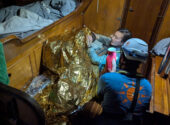Four civilian rescue ships are currently blocked in Italian ports. Dozens of organizations have therefore issued an “urgent warning”.
Citing the so-called Meloni Decree, Italy is blocking four civilian ships conducting search and rescue operations in the Central Mediterranean. The decree, issued under far-right Prime Minister Giorgia Meloni earlier this year, penalizes sea rescuers who take more people on board after a mission without having first headed for the mainland. To this end, authorities assign captains to ports up to 1,600 kilometers and five days’ travel from the site of the rescue.
For having carried out more than one such rescue, the German ships “Aurora” and “Sea-Eye 4” are currently detained in Italian ports, as well as the Spanish-registered “Open Arms”. In addition, there is the ship “Mare Jonio” of the Italian organization Mediterranea, which was put on the chain after an inspection by the authorities for technical “irregularities”.
Because of the obstructions, 56 organizations have now issued an “urgent warning.” Since the Meloni decree was issued, there have been eight arrests in Italy, it says. Operators of the affected ships must pay a fine of up to €10,000 and are banned from sailing for 20 days. For the “Aurora” and the “Sea-Eye 4” it is already the second reprisal of this kind. In case of further violations they are threatened with final confiscation.
In their statement, the signatories point out that, according to international law, the disembarkation of persons rescued from distress at sea must take place in a safe place “as soon as possible”. However, in more than 60 cases since December 2022, Italian authorities have assigned rescue vessels to an unnecessarily distant port, they said.
The sea rescuers are also faced for the first time with the instruction to disembark rescued people in Tunisia. This had first been reported by the organization Sea-Watch, whose “Aurora” was assigned the Sicilian port of Trapani by the sea rescue control center in Rome after a mission this month. However, due to a lack of fuel, the captain decided to head for Lampedusa. In response, the Italian authorities had suggested that the “Aurora” sail to Tunisia instead. “With a severe lack of protection for asylum seekers, Tunisia is currently experiencing a surge of violence against migrant populations, meaning that the country cannot be considered a Place of Safety”, the 56 organizations wrote on the matter.
The background to the new instructions could be the “strategic partnership” that the EU Commission recently concluded with the government in Tunis. Its coast guard is to ensure that fewer people travel to Italy in boats. In return, Tunisia will receive over €250 million from Brussels for migration control measures. The President of the Commission Ursula von der Leyen had signed the agreement in the presence of Meloni.
“If humanitarian assistance at sea continues to be obstructed, we are likely to see a drastically decreased – or even non-existent – presence of civilian search and rescue vessels in the Central Mediterranean by the end of the year”, the “urgent warning” said. This, it adds, has already led to the withdrawal of many ships in Greece.
However, an end to private sea rescue is not yet in sight: at least 18 organizations have more than 20 ships in operation in the Central Mediterranean. But increasingly, these are sailboats that, like the “Trotamar III,” can hardly take people from distress at sea on board and therefore mainly run missions of observation. But also bigger ships are being prepared for new deployment, including the “Sea Watch 5”, which is to be sent from the German city of Flensburg to the Mediterranean later this year.
Published in German in „nd“.
Image: Due to a lack of fuel, the “Aurora” was supposed to head for Tunisia, but then dropped anchor in Lampedusa (Sea Watch).





Leave a Reply